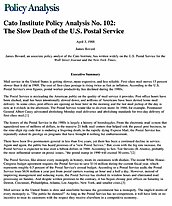Mail service in the United States is getting slower, more expensive, and less reliable. First-class mail moves 15 percent slower than it did in 1969. The cost of first-class postage is rising twice as fast as inflation. According to the U.S. Postal Service’s own figures, postal worker productivity has declined during the 1980s.
The Postal Service is misleading the American public on the quality of mail service it provides. Post office hours have been slashed, mail has been intentionally slowed down, and millions of Americans have been denied home mail delivery. In some cities, post offices are opening an hour later in the morning and the last mail pickup of the day is now at 4 o’clock in the afternoon. The Postal Service would like to do even more: In 1986, for example, Postmaster General Albert Casey advocated abolishing Monday mail deliveries and abolishing standards for two-day delivery of first-class mail.[1]
The history of the Postal Service in the 1980s is largely a history of boondoggles. From the electronic mail system that squandered tens of millions of dollars, to the massive 21 bulk mail centers that helped sink the parcel post business, to the nine-digit zip code that is enduring a lingering death, to the rapidly dying Express Mail, the Postal Service has repeatedly staked its prestige on programs that have brought it nothing but embarrassment.
There have been five postmasters general in less than five years, yet there has been a continued decline in service. Again and again, the public has heard promises of a “new Postal Service.” But, even with the big rate increase, the Postal Service is expected to lose over a billion dollars in 1988. According to Sen. Ted Stevens (R‑Alaska), probably the most influential senator on postal issues, “the postal stamp in 1990 will exceed 30 cents.”[2]
The Postal Service, like almost every monopoly in history, treats its customers with disdain. The recent White House-Congress budget agreement requires the Postal Service to save $116 million during the current fiscal year, which represents roughly 0.5 percent of the Postal Service’s annual budget. According to a Postal Service audit, the Postal Service loses $636 million a year just from postal carriers wasting an hour and a half a day. However, instead of improving management and reducing waste, the Postal Service has slashed its window hours and eliminated mail processing on Sunday. And despite written promises to the contrary, it has begun closing post offices on Saturday in Detroit, Cincinnati, Philadelphia, Atlanta, Los Angeles, New York, and smaller cities.[3]
Mail service in the United States is slow and unreliable because the government has a monopoly. The implicit motto of every monopoly is, “The public be damned!” As long as the Postal Service has no competition, it will have little or no incentive to treat its customers with the respect they receive elsewhere in a competitive economy.
With over 800,000 employees, the Postal Service is the United States’ largest employer. It has added more new employees–150,000–during the Reagan years than have been cut by all other federal agencies to reduce federal employment. However, the more workers the Postal Service has hired, the worse service has become, and the more incorrigible the system appears to be. On top of this, according to Postal Rate Commissioner John Crutcher, U.S. postal workers are “the highest paid semi-skilled workers in the world.”[4] The average annual remuneration–including overtime pay and benefits–is now $38,751 per worker.[5]

This work is licensed under a Creative Commons Attribution-NonCommercial-ShareAlike 4.0 International License.

